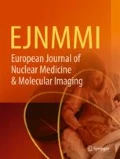Abstract
Purpose
Evidence to date has failed to reveal unique female determinants of cardiovascular disease. However, a strong association was recently observed between increased metabolic activity in the amygdala, a neural centre involved in the processing of emotions, and impaired myocardial function in women, but not in men. Given the stronger immune responses in females, we sought to retrospectively investigate the interaction between inflammation, perceived stress, and myocardial injury.
Methods
Overall, 294 patients (mean age 66.9 ± 10.0 years, 28.6% women) underwent both, 99mTc-tetrofosmin single-photon emission computed tomography myocardial perfusion imaging and 18F-fluorodeoxyglucose (18F-FDG) positron emission tomography/computed tomography for the assessment of cardiac function, bone marrow metabolism (surrogate marker of inflammation), and resting amygdalar activity.
Results
A positive association was found between amygdalar metabolism and 18F-FDG bone marrow uptake in women (r = 0.238, p = 0.029), but not in men (r = 0.060, p = 0.385). Linear regression models selected both, abnormal left ventricular ejection fraction (LVEF) and abnormal myocardial perfusion, as significant indicators of an increased amygdalar activity in women (B-coefficient LVEF, − 0.096; p = 0.021; abnormal myocardial perfusion, 3.227; p = 0.043), but not in men (bone marrow p = 0.076; abnormal myocardial perfusion p = 0.420). Accordingly, an interaction term consisting of sex and LVEF/abnormal myocardial perfusion was significant (p = 0.043 and p = 0.015, respectively).
Conclusions
Upregulated amygdalar metabolism is associated with an enhanced inflammatory state in female patients with impaired cardiac function. Given that enhanced activity of the limbic system is associated with worse cardiovascular outcomes, our study suggests that a focus on inflammatory markers and indicators of distress might help to tailor cardiovascular risk assessment and therapy towards the female cardiovascular phenotype.

References
Libby P. Inflammation in atherosclerosis. Nature. 2002;420:868–74.
Greiten LE, Holditch SJ, Arunachalam SP, Miller VM. Should there be sex-specific criteria for the diagnosis and treatment of heart failure? J Cardiovasc Transl Res. 2014;7:139–55.
Templin C, Hanggi J, Klein C, Topka MS, Hiestand T, Levinson RA, et al. Altered limbic and autonomic processing supports brain-heart axis in Takotsubo syndrome. Eur Heart J. 2019;40:1183–7.
Mitoff PR, Gam D, Ivanov J, Al-hesayen A, Azevedo ER, Newton GE, et al. Cardiac-specific sympathetic activation in men and women with and without heart failure. Heart. 2011;97:382–7.
La Rovere MT, Bigger JT Jr, Marcus FI, Mortara A, Schwartz PJ. Baroreflex sensitivity and heart-rate variability in prediction of total cardiac mortality after myocardial infarction. ATRAMI (Autonomic Tone and Reflexes After Myocardial Infarction) investigators. Lancet. 1998;351:478–84.
Fiechter M, Roggo R, Burger IA, Bengs S, Treyer V, Becker A, et al. Association between resting amygdalar activity and abnormal cardiac function in women and men: a retrospective cohort study. Eur Heart J Cardiovasc Imaging. 2019;20:625–32.
Mehta PK, Lima BB, Nelson MD, Bairey Merz CN. Adverse cardiovascular outcomes in women: blame the amygdala? Eur Heart J Cardiovasc Imaging. 2019;20:633–5.
Ulrich-Lai YM, Herman JP. Neural regulation of endocrine and autonomic stress responses. Nat Rev Neurosci. 2009;10:397–409.
Kurmann RD, Mankad R. Atherosclerotic heart disease in women with autoimmune rheumatologic inflammatory conditions. Can J Cardiol. 2018;34:381–9.
Boellaard R, Delgado-Bolton R, Oyen WJ, Giammarile F, Tatsch K, Eschner W, et al. FDG PET/CT: EANM procedure guidelines for tumour imaging: version 2.0. Eur J Nucl Med Mol Imaging. 2015;42:328–54.
Verberne HJ, Acampa W, Anagnostopoulos C, Ballinger J, Bengel F, De Bondt P, et al. EANM procedural guidelines for radionuclide myocardial perfusion imaging with SPECT and SPECT/CT: 2015 revision. Eur J Nucl Med Mol Imaging. 2015;42:1929–40.
Siegrist PT, Gaemperli O, Koepfli P, Schepis T, Namdar M, Valenta I, et al. Repeatability of cold pressor test-induced flow increase assessed with H(2)(15)O and PET. J Nucl Med. 2006;47:1420–6.
Wyss CA, Koepfli P, Fretz G, Seebauer M, Schirlo C, Kaufmann PA. Influence of altitude exposure on coronary flow reserve. Circulation. 2003;108:1202–7.
Xiao H, Li H, Wang JJ, Zhang JS, Shen J, An XB, et al. IL-18 cleavage triggers cardiac inflammation and fibrosis upon beta-adrenergic insult. Eur Heart J. 2018;39:60–9.
Fiechter M, Haider A, Bengs S, Marȩdziak M, Burger IA, Roggo A, et al. Sex Differences in the Association between Inflammation and Ischemic Heart Disease. Thrombosis and Haemostasis. 2019;119:1471–1480.
Acknowledgements
We would like to thank the staff at the Department of Nuclear Medicine of the University Hospital Zurich for their contribution to this study.
Funding
CG was supported by grants from the Swiss National Science Foundation (SNSF), the Olga Mayenfisch Foundation, Switzerland, the OPO Foundation, Switzerland, the Novartis Foundation, Switzerland, the Swissheart Foundation, the Helmut Horten Foundation, Switzerland, and the EMDO Foundation, Switzerland. MF was supported by the Swiss Paraplegic Center, Nottwil, Switzerland. MM was supported by the Iten-Kohaut Foundation, Switzerland.
Author information
Authors and Affiliations
Corresponding author
Ethics declarations
Conflict of interest
All authors have the following to disclose: The University Hospital of Zurich holds a research contract with GE Healthcare. CG has received research grants from the Novartis Foundation, Switzerland, and speaker’s fees from Sanofi Genzyme.
Ethical approval
Our study was approved by the local ethics board (BASEC No. 2017–01112) and is in line with the Declaration of Helsinki (including later amendments). The need for informed consent was waived by the local ethics board due to the retrospective design of the present study.
Additional information
Publisher’s note
Springer Nature remains neutral with regard to jurisdictional claims in published maps and institutional affiliations.
This article is part of the Topical Collection on Cardiology
Rights and permissions
About this article
Cite this article
Fiechter, M., Haider, A., Bengs, S. et al. Sex-dependent association between inflammation, neural stress responses, and impaired myocardial function. Eur J Nucl Med Mol Imaging 47, 2010–2015 (2020). https://doi.org/10.1007/s00259-019-04537-8
Received:
Accepted:
Published:
Issue Date:
DOI: https://doi.org/10.1007/s00259-019-04537-8

